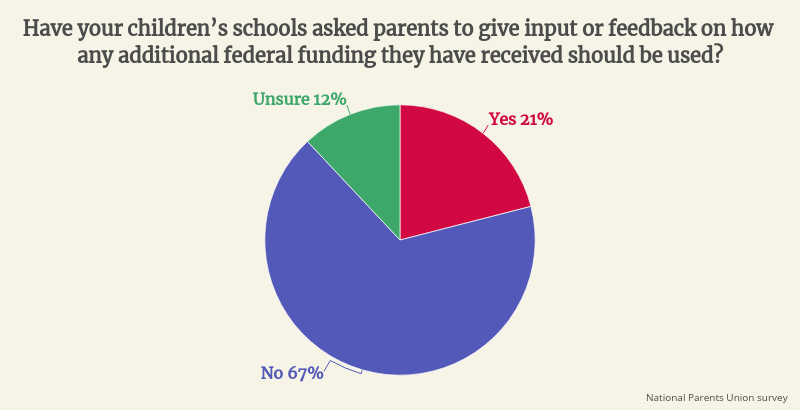‘We Are Going to Hold You Accountable’: Just 1 in 5 Families Was Asked for Input into School Stimulus Fund Spending, New Poll Finds

Get stories like these delivered straight to your inbox. Sign up for The 74 Newsletter
Just 1 in 5 families has been asked for input into how their schools spend an unprecedented $122 billion in federal stimulus funds, despite a mandate that states and districts incorporate feedback from a broad array of community members, a new National Parents Union survey finds.
Middle- and upper-income families were more likely to say their schools solicited parent opinions than those with household incomes of less than $50,000 a year. Just 17 percent of low-income parents say they were asked how the money should be used, versus 28 percent of those earning $75,000 or more.
Echelon Insights surveyed 1,000 parents on behalf of the organization from Sept. 9 to 13, after the school year had begun in most places. Slightly more than half, or 51 percent, had heard little or nothing about the funds, while just 13 percent said they have heard a lot.
The parents union pegged the release of its latest poll to the launch of a campaign called Everyday Parents Impacting Change, or EPIC, with the aim of holding local officials accountable for how they spend their American Rescue Plan Elementary and Secondary School Emergency Relief (ESSER lll) funds.
“Since we weren’t invited to a full seat at the table, we really need to play a watchdog role,” says Keri Rodrigues, parents union president and co-founder. “If you aren’t going to engage us on our priorities, we are going to hold you accountable for where every single one of these dollars is going.”
District spending plans are due to be submitted to states Oct. 1, but early glimpses show that in a number of places, school system leaders have committed to expenditures that education finance experts have cautioned will create steep fiscal cliffs when the stimulus funds run out in three years. Among these is increasing salaries, plugging pre-pandemic budget deficits caused by long-term enrollment declines and hiring new permanent staff.
While the federal funding can be used for an array of expenses, Congress has sought to prod schools to spend a hefty portion on addressing the pandemic’s outsized impact on academic achievement among underserved children who were already at increased risk of performing below their affluent classmates.
Ninety percent of the funds are being sent directly to districts according to a formula that prioritizes schools that enroll large numbers of disadvantaged students. School systems are supposed to spend a fifth of the money to address pandemic learning losses using strategies backed by hard evidence.
Nearly 80 percent of respondents surveyed by the parents union said their top priorities for the funds include computers, high-speed internet access, services for students with disabilities — who were particularly impacted by COVID-related school shutdowns — face masks, hand sanitizer and free food. Three-fourths would prioritize counselors, social workers and psychologists, career and college prep programs, staff training on creating inclusive environments and individual learning plans for each student.
Schools that fail to solicit community input, parents union leaders say, are missing an opportunity to seek guidance from families who have gained a much keener sense of their children’s interests and struggles since the pandemic forced them to supervise distance learning.
“Black and brown families throughout the pandemic have been more engaged than ever,” says Rodrigues. “To now turn your back on them and say, ‘We’ve got it from here’ really underestimates these families.”
The poll diverged on one major point from another recent survey by the journal Education Next, which found diminished appetite for change among a weary public. The parents union’s monthly polls continue to find a strong desire for schools to come out of the pandemic with better instruction and climate.
Sixty percent of respondents told parent union pollsters they want schools to find new ways to teach children as a result of the pandemic, while 57 percent said education leaders should use the infusion of funds to make “bold changes.” A third (34 percent) want the money to be used to return to the status quo.
Both the Education Next and parents union polls found strong support for continued annual testing of students, with the new survey finding 55 percent of parents want exams to continue and 39 percent thinking tests should be skipped this year.
The poll’s results are available on the parents union website.
Disclosure: The Walton Family Foundation, the City Fund, the Bill & Melinda Gates Foundation, the Chan Zuckerberg Initiative, the Charles and Lynn Schusterman Family Foundation and the Carnegie Corporation of New York provide financial support to the National Parents Union and The 74.
Get stories like these delivered straight to your inbox. Sign up for The 74 Newsletter


